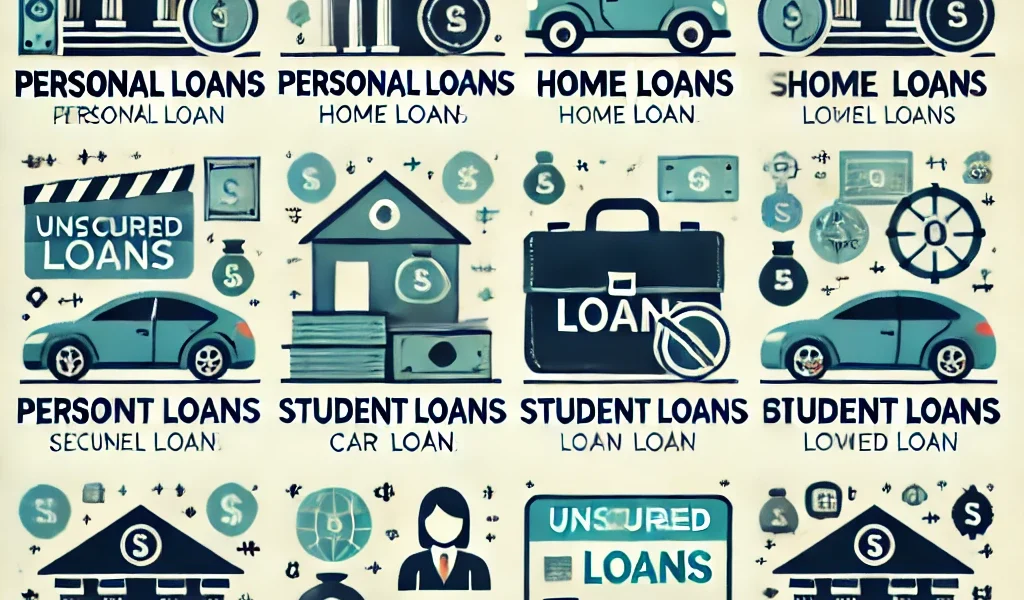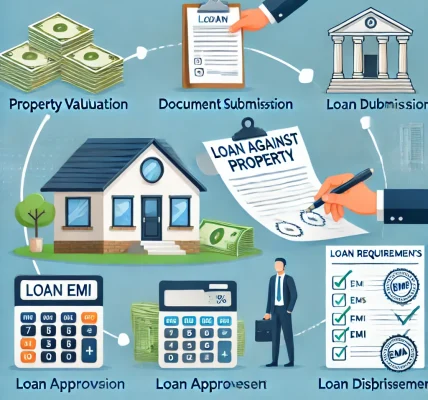Introduction
Loans play a crucial role in financial planning, providing necessary funds for various needs, whether personal or business-related. Understanding different types of loans and their terms can help borrowers make informed decisions. This guide explores the major loan types, their benefits, eligibility criteria, and considerations before applying.
1. Secured vs. Unsecured Loans
Secured Loans: These loans require collateral, such as property, gold, or vehicles, which the lender can seize in case of non-payment. Common examples include home loans and car loans.
Unsecured Loans: These loans do not require collateral but come with higher interest rates. Examples include personal loans and credit card loans.
Pros of Secured Loans:
- Lower interest rates
- Higher borrowing limits
- Longer repayment periods
Pros of Unsecured Loans:
- No risk of losing assets
- Faster approval process
- Suitable for small, short-term financial needs
2. Personal Loans
A personal loan is a flexible unsecured loan used for various purposes, such as medical emergencies, vacations, weddings, or home renovations.
Features:
- No collateral required
- Fixed or variable interest rates
- Quick approval and disbursement
Considerations:
- Higher interest rates compared to secured loans
- Shorter repayment tenure
3. Home Loans
Home loans are secured loans used to buy, build, or renovate a property. They come with lower interest rates due to their secured nature.
Types of Home Loans:
- Fixed-rate home loans: Fixed interest rate throughout the tenure
- Floating-rate home loans: Interest rate fluctuates based on market trends
- Home improvement loans: Specifically for renovations and repairs
Considerations:
- Long repayment tenure (up to 30 years)
- Impact of credit score on loan approval and interest rates
4. Car Loans
Car loans are secured loans used to purchase new or used vehicles. The vehicle itself serves as collateral.
Features:
- Fixed EMIs (Equated Monthly Installments)
- Flexible repayment terms
- Lower interest rates for new cars compared to used cars
Considerations:
- Depreciation of vehicle value
- Additional insurance and maintenance costs
5. Education Loans
Education loans help students finance higher studies, either domestically or internationally.
Features:
- Covers tuition fees, accommodation, and study materials
- Repayment starts after course completion (moratorium period)
- Government subsidies available for certain income groups
Considerations:
- Loan approval depends on the credibility of the institution and course
- Interest rates may vary based on the lender and country of study
6. Business Loans
Business loans support entrepreneurs and businesses in expansion, operations, or capital investment.
Types of Business Loans:
- Term loans: Fixed amount borrowed for a set period
- Working capital loans: Helps manage daily business expenses
- Equipment loans: Specifically for purchasing machinery or equipment
Considerations:
- Business performance and creditworthiness affect approval
- Higher interest rates for startups due to risk factors
7. Gold Loans
Gold loans are secured loans where borrowers pledge gold jewelry as collateral.
Features:
- Quick approval and disbursement
- Lower interest rates compared to unsecured loans
- Shorter tenure compared to home or business loans
Considerations:
- Risk of losing gold in case of non-repayment
- Loan amount depends on gold valuation
8. Payday Loans
Payday loans are short-term, high-interest loans meant for immediate cash needs before the next paycheck.
Features:
- Fast approval process
- No collateral required
Considerations:
- Extremely high interest rates
- Can lead to a debt cycle if not repaid on time
9. Debt Consolidation Loans
These loans help borrowers merge multiple debts into a single loan with a lower interest rate and structured repayment plan.
Features:
- Simplifies debt management
- Lower monthly payments
- Reduces overall interest burden
Considerations:
- Requires strong creditworthiness
- May extend repayment period, increasing total interest cost
10. Green Loans
Green loans fund environmentally sustainable projects, such as solar panels, electric vehicles, or energy-efficient home improvements.
Features:
- Lower interest rates due to government incentives
- Supports environmental sustainability
Considerations:
- Eligibility criteria may vary
- Limited to specific eco-friendly purposes
Conclusion
Choosing the right loan depends on the borrower’s financial needs, creditworthiness, and repayment ability. Understanding different loan types, terms, and conditions ensures better financial planning and responsible borrowing. Always compare loan options, read the fine print, and consult financial advisors before committing to a loan.




